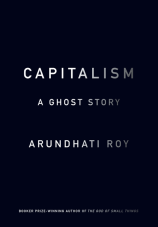Verso books
It is the story of how the largest democracy in the world, with over 800 million voting in the last election, answers to the demands of globalized capitalism, subjecting millions of people to inequality and exploitation. Roy shows how the mega-corporations, modern robber barons plundering India’s natural resources, use brute force, as well as a wide range of NGOs and foundations, to sway government and policy making in India.
Autor*innen: Arundhati Roy
Autor*innen: Ian Bone; Alan Pullen, Tim Scargill
A thrilling and vivid work of history, Class War weaves together literature and politics to chart the making and unmaking of social class through revolutionary combat. In a narrative that spans the globe and more than two centuries of history, Mark Steven traces the history of class war from the Haitian Revolution to Black Lives Matter. Surveying the literature of revolution, from the poetry of Shelley and Byron to the novels of Émile Zola and Jack London, exploring the writings of Frantz Fanon, Che Guevara, and Assata Shakur, Class War reveals the interplay between military action and the politics of class, showing how solidarity flourishes in times of conflict. Written with verve and ranging across diverse historical settings, Class War traverses industrial battles, guerrilla insurgencies, and anticolonial resistance, as well as large-scale combat operations waged against capitalism’s regimes and its interstate system.
Autor*innen: Mark Steven
The Paris Commune was a laboratory of political invention, important simply and above all for, as Marx reminds us, its own ‘working existence.’ Communal Luxury allows readers to revisit the intricate workings of an extraordinary experiment.
Autor*innen: Kristin Ross
Autor*innen: Andreas Malm
The three-volume text by Henri Lefebvre is perhaps the richest, most prescient work about modern capitalism to emerge from one of the twentieth century's greatest philosophers and is now available for the first time in one complete volume. Written at the birth of post-war consumerism, Critique was an inspiration for the 1968 student revolution in France. It is a founding text of cultural studies and a major influence on the fields of contemporary philosophy, geography, sociology, architecture, political theory and urbanism. Lefebvre takes as his starting point and guide the "trivial" details of quotidian experience: an experience colonized by the commodity, shadowed by inauthenticity, yet remaining the only source of resistance and change. This is an enduringly radical text, untimely today only in its intransigence and optimism.
Autor*innen: Henri Lefebvre
As Americans take to the streets in record numbers to resist the presidency of Donald Trump, L.A. Kauffman’s timely, trenchant history of protest offers unique insights into how past movements have won victories in times of crisis and backlash and how they can be most effective today. This deeply researched account, twenty-five years in the making, traces the evolution of disruptive protest since the Sixties to tell a larger story about the reshaping of the American left. Kauffman, a longtime grassroots organizer, examines how movements from ACT UP to Occupy Wall Street to Black Lives Matter have used disruptive tactics to catalyze change despite long odds.
Autor*innen: L. A. Kauffman
Autor*innen: Frédéric Gros
From the 1880s to the 1920s, a profound social awakening among women extended the possibilities of change far beyond the struggle for the vote. Amid the growth of globalized trade, mass production, immigration and urban slums, American and British women broke with custom and prejudice. Taking off corsets, forming free unions, living communally, buying ethically, joining trade unions, doing social work in settlements, these "dreamers of a new day" challenged ideas about sexuality, mothering, housework, the economy and citizenship.
Autor*innen: Sheila Rowbotham
Autor*innen: Cinzia Arruzza; Tithi Bhattacharya; Nancy Fraser
Young people are inheriting a world of climate catastrophe. Young people are also one of the strongest forces leading movements for climate justice, and to halt the fossil fuel emissions that are making our Earth unlivable. As Greta Thunberg and the Fridays for the Future movement have made clear, solutions offered by adults are far too little, far too late: the measures in unenforceable international agreements won't halt our reliance on fossil fuels, or take the drastic steps humans need to take in order to keep our planet livable.
Autor*innen: Andreas Malm
Bearded bomb-throwers, self-indulgent nihilists, dangerous subversives - these characteristic clichés of anarchists in the popular imagination are often reproduced in the cinema. In Film and the Anarchist Imagination, the first comprehensive survey of anarchism in film, Richard Porton deconstructs such stereotypes while offering an authoritative account of films featuring anarchist characters and motifs.
Autor*innen: Richard Porton


























